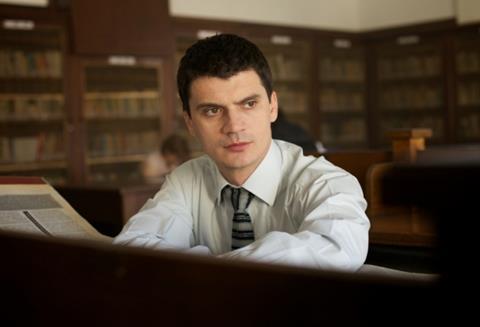Dr: Tudor Giurgiu. Romania-Hungary-Bulgaria. 2015. 130mins

Though based on the true story of a young Romanian State prosecutor who committed suicide in 2002 for reasons that were never sufficiently investigated, Tudor Giurgiu’s new film Why Me? (Dece Eu) is in no way the account of a scandal strictly limited to Romania but uncomfortably familiar to many other corners of the world.
Any difficulty the film might have in reaching its audiences will probably be caused by the masses of information poured into the first half and by several unsubstantial characters who weigh the story down.
Giurgiu, a film producer and director who had been for a brief while the director of the Romanian National Television (and had the dubious pleasure of being submitted to political pressures that finally resulted in his departure) has been fascinated for years by the fate of Cristian Panait, a 29 year-old rising new star of the Romanian State Prosecution who was entrusted a corruption case in the provinces and when he did not come up with the results his superiors expected, had the case removed from his hands and later jumped off the roof terrace of the house he lived, to his death.
In the film version, the main character, called now Cristian Panduru (Emilian Oprea), a young presentable but rather stiff-necked, stands-offish lawyer, employed by the State Prosecution while still working on his Ph.D., is just about to nail a corrupt member of parliament when he is taken off the case by his boss, Codrea (Mihai Constantin), and told he is handed the hottest potato on the plate, the investigation of the well-known villain, the Oradea prosecutor, Leca (Alin Florea) suspected of having demanded and received sizable bribes and kickbacks and of sending people to jail if they did not comply.
Panduru’s first juridical probes into the case fail. He doesn’t grasp the reasons the evidence does not add up and as he fumbles around in the dark, subjected to heavy pressures to wrap the case rapidly, coming not only from his immediate superior but all the way up to Ministerial level. Panduru, a humorless career man, is stressed to the point it affects his personal relationships and ends by driving him into an acute state of paranoia, which, as it often happens in many other cases of this kind, turns out to be at least partly justified.
Relieved of his responsibilities, he is invited to take some time off and is fired behind his back - only then does he realise that he had been the patsy whose job was to prosecute and condemn the wrong person in a gruesome game of power involving several secret services and their illicit financiers. As for the role of people like him in the legal system, a long visit to Codrea’s home towards the end of the film, probably the film’s best scene, dispels any illusions that justice, decency or the law have anything to do with it.
Any difficulty the film might have in reaching its audiences will probably be caused by the masses of information poured into the first half and by several unsubstantial characters who weigh the story down. Their presence explains the hero’s confusion, but it leaves the audience pretty much in the dark as well, one place where they never like to be.
Also Panduru, like the real-life Panait, is not the kind of hero to cherish, and while faithful to the character, Emilian Oprea’s performance will not draw the automatic sympathy needed to carry viewers through the dry patches. It may sound immoral, but since this is supposed to be a fiction film, being less meticulously faithful to the actual facts that inspired it could have made the story much clearer and pushed it faster all the way into the second, more conclusive and powerful second half of the film.
Production company: Libra Film
International sales: Ioanna Stais, joanna@heretic.gr
Producers: Oana Giurgiu
Screenplay: Tudor Giurgiu, Loredana Novak
Cinematography: Marius Panduru
Editor: Lemhenyi Reka
Production designer: Cristian Niculescu
Music: Viktor Chouchkov
Main cast: Emilian Oprea, Mihai Constantin, Andreea Vasile, Dan Condurache, Liviu Pintileasa, Mihai Smarandache, Alin Florea, Lucretia Mandric, Sore Mihalache, Ionut Caras, Virgil Ogasanu















![[L-R]: Amanda Villavieja, Laia Casanovas, Yasmina Praderas](https://d1nslcd7m2225b.cloudfront.net/Pictures/274x183/6/4/1/1471641_pxl_20251224_103354743_618426_crop.jpg)





